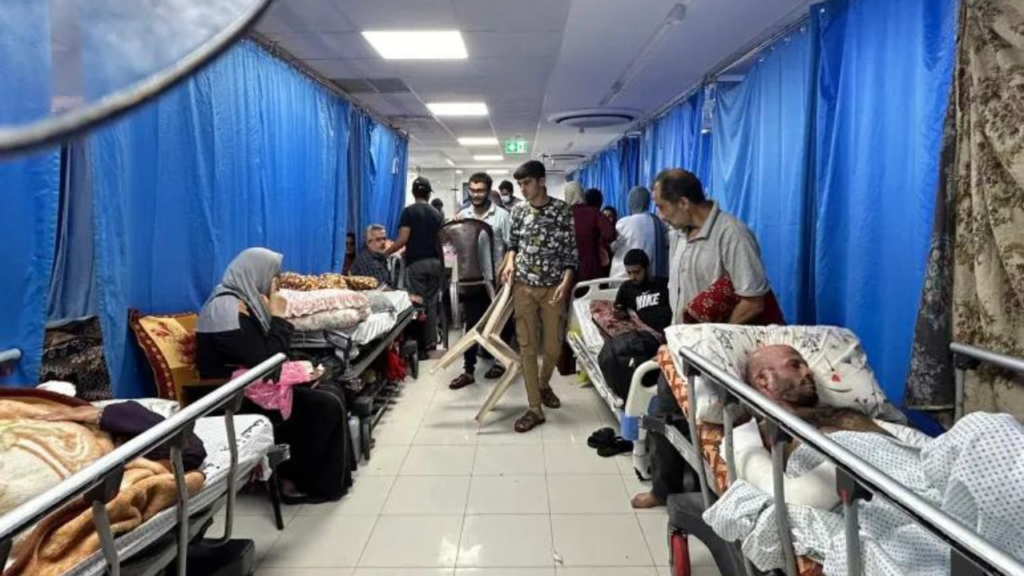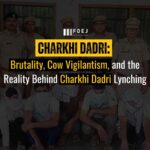The Israel-Gaza conflict has been ongoing, and as the world focuses on the political and military aspects of the situation, it’s crucial to shed light on the devastating impact it has on the most vulnerable population—children.
During the initial week of Israel’s military offense in Palestine, over 700 Palestinian children tragically lost their lives. In contrast, the Ukraine conflict, which garnered widespread international attention and media coverage, saw 560 children affected throughout an entire year. According to Palestinian officials, the assault has claimed the lives of more than 8,200 children in Gaza over in the first 11 weeks, with at least 8,600 more injured.

On the Ground Realities:
Ahmed al-Moghrabi, head of plastic surgery at Nasser Hospital, paints a grim picture, describing constant bombings and the grim aftermath of treating Palestinians injured by Israeli attacks. Meanwhile, Hamas acknowledges faults in its actions, and an Israeli Reserve Major-General foresees the challenges in a potential war with Hezbollah.
Since October 7, Israeli attacks have claimed over 25,000 lives and left 62,681 wounded in Gaza. On the Israeli side, the death toll from the Hamas attack on October 7 stands at 1,139.
Despite international pleas for a ceasefire, Israeli Prime Minister Benjamin Netanyahu refuses any deal with Hamas, prolonging the conflict and worsening the humanitarian crisis. The toll on Palestinian children reaches alarming numbers, with 700 reported dead in the first week alone.

Amputations without Anaesthesia:
UNICEF’s alarming statistics reveal that, since October 7, over 1,000 children in Gaza have experienced the traumatic loss of one or both legs without any anesthesia. The repercussions of these amputations extend far beyond the physical, as the emotional and psychological toll on these young lives is immeasurable.
The Heart-Wrenching Story of Duniya:
The tragic story of 12-year-old Dunia, as documented by Defense for Children Palestine, sheds light on the harrowing experiences faced by these children. Dunia lost her leg in an Israeli airstrike that also claimed the lives of her entire family. In a poignant interview conducted during a seven-day truce on November 25, Dunia shared her painful journey.

Dunia’s Interview (Shared in the period following her death):
“When they shelled us with the second missile, I woke up and was surrounded by rubble. I realized that my leg had been cut off because there was blood, and I had no leg. I tried to move it, but it wouldn’t move. My father and mother were martyred. My brother Mohammad and my sister Dalia, too. I want someone to take me abroad, to any country, to install a prosthetic leg, to be able to walk like other people, so that I can move and go out and play with my siblings. I want to become a doctor, like those who treat us, so that I can treat other children. I only want one thing: for the war to end.”

Winter and Diseases:
The situation in South Gaza has reached a critical point as displaced Palestinians face immense challenges in obtaining essential medicines for their ailing children. Mothers are worries about the desperate conditions, sleeping in tents without warmth for up to 10 hours as they search in vain for fever medication, antibiotics, and pain relief.
The scarcity of medical supplies has escalated existing health problems among children, with access to medicine and healthcare becoming nearly impossible. In a region where 36 hospitals are either non-operational or functioning at a fraction of their capacity, the consequences are dire. Diseases, particularly diarrhoea cases among children, have surged to levels 20 times higher compared to the previous year.

As per the Aljazeera reports, Dr. RJ, working at the European Hospital in Khan Yunis, reported approximately 1,000 cases daily, emphasizing the difficulty parents face in accessing medical care for their children. Tragically, families lose children daily due to shortages of basic medicines in this dire situation.
As winter approaches, the crisis is expected to worsen, with a critical drop in temperatures posing additional threats to vulnerable families lacking proper housing and heating. Pneumonia and other cold-related illnesses could become rampant, adding to the already dire health conditions.

An Israeli Writer’s stand:
During a literary event in Israel Motti Lerner, a prominent Israeli playwright and screenwriter expressed his concerns on Gaza. “I’m finding it increasingly difficult to identify with a country that has claimed the lives of 11,000 children, “said the writer. He drew a parallel between the actions of prominent figures in Nazi Germany responsible for the deaths of thousands of children and those of the Israeli army, which has reportedly caused the loss of over 10,000 children’s lives in Gaza.
As the world watches, the Israel-Gaza conflict underscores the importance of addressing the immediate humanitarian needs and working towards a sustainable resolution that prioritizes the well-being of all those affected, particularly the children who bear the heaviest burden of this protracted tragedy.









